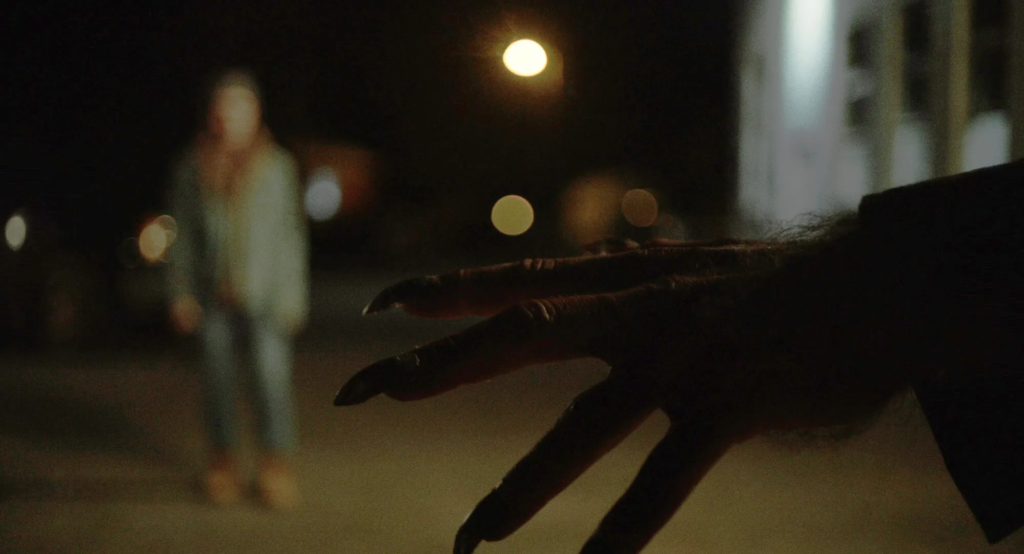Director: Larry Fessenden
Writer: Larry Fessenden
Stars: Alex Hurt, Marshall Bell, Michael Buscemi
Synopsis: A Fine Arts painter is convinced that he is a werewolf wreaking havoc on a small American town under the full moon.
Larry Fessenden is a very clever man. He is a cinematic horror poet who, like many of his friends and collaborators, insists that the “monster” is rarely the problem – it is the people who are.
Talbot Grove in upstate New York is about to be turned into an environmental nightmare by corrupt developer Jack Hammond (Marshall Bell). Charley Barrett’s (Alex Hurt) father worked with Jack Hammond creating some more than dubious deals. After the death of his father (played in photographs by William Hurt, Alex Hurt’s real-life father) an alcoholic and control freak, Charley begins to sort through his papers. He discovers that all was not copacetic and begins to drown himself in alcohol and withdraws to spend solitary time painting.

Charley was also in love with, and engaged to, Hammond’s daughter, Sharon (Addison Timlin) while he was working as a contracting boss for Hammond. But during his desperate self-annihilating, booze-soaked nightmare something happened. Charley got bitten by a werewolf and the consequences are reverberating through the whole community.
Blackout cleverly references the original Universal Monster pictures starring Lon Chaney, Jr. but instead of the Romani people being the scapegoat for what is considered the other, it is Mexican and Latino workers who are being exploited by Hammond’s company. Hammond thinks he owns the town and the land, and to some extent he does. He employs most of the people in the region and sets workers against each other. He sows division for profit.
Charley, of course, being a werewolf, experiences the same memory blackouts that Larry Talbot did. As he is an artist, he uses his unconscious memories to draw what he believes he has done. Fessenden is working on a very limited budget, so he employs artwork (provided by John Mitchell) and animation (regular animator James Siewert) to signal the werewolf phase over the three-night period.
Larry Fessenden is working with some of his long-term collaborators both in front of and behind the camera. James Le Gros, Jenn Wexler, Jeremy Holm, Joe Swanberg, and Barbara Crampton, for example. Fessenden’s horror films including Wendigo, Deranged (a blink and you’ll miss it cameo from Alex Breaux is included) and Habit always recognize the mythology around a Monster. Fessenden reconfigures that mythology into metaphors for division, loneliness, and the consuming nature of humans. It is often noted that Frankenstein’s creature is the most tragic of the Universal Monsters; however Fessenden understands that the Wolf Man is the loneliest of all.
Creating an eco-thriller and a discussion of contemporary American politics and capitalism out of a genre film is pure Fessenden genius. Larry has always had a connection to place and space in the American rural, urban, or industrial landscape. Whether it be from his early roles in Kelly Reichardt films, to working with Ted Geoghegan, Ti West, and titans like Martin Scorsese and Jim Jarmusch:; Larry Fessenden cares about how Americans connect psychologically, and in actuality, to an environment and who it ostensibly belongs to.

Few directors working within the budget that Fessenden does can create such powerful real-world fables around existing material. Despite being a chameleon actor, he is a horror auteur who gets to a specific heart residing inside what the audience considers the monstrous.
Once again, Larry Fessenden has given audiences a brilliant insight into contemporary America through the lens of monstrosity. Blackout is a melancholy, funny, gore-soaked, and, at times, hopeless film about the tragic werewolf and the impulses he cannot control. A letter Charley leaves for Sharon provides the thesis to Blackout. “I think about the misery and terror I spread when I have no control. And I think about what people do when they have control. The combat. They miss the sweetness of life. I’m not sure what I’ll miss. I’ll miss you.” Fessenden proves that there are things American people can and should be doing to prevent tragedies that are bloodier and more scarring than the claws of a werewolf.





